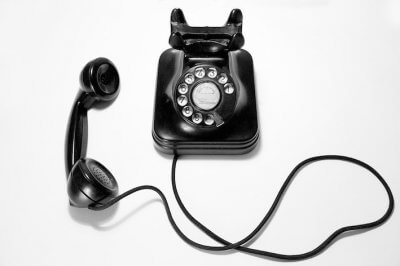Yes, Telephone Counselling is Still a Thing – Here’s Why
 Find the new trend of therapy over video platforms terrifying? Feel more at ease sharing if someone isn’t looking at you? You’ll be happy to know that telephone counselling is still popular, and with good reason.
Find the new trend of therapy over video platforms terrifying? Feel more at ease sharing if someone isn’t looking at you? You’ll be happy to know that telephone counselling is still popular, and with good reason.
What is telephone counselling?
It’s exactly what it sounds. It means you do your talk therapy sessions over the phone, with a registered, licensed mental health professional. They create a safe space for you to discuss your thoughts, feelings, life struggles, and mental health concerns.
A proper telephone counsellor has the same training and certification as any other counsellor or psychotherapist.
Telephone therapy is used to offer general counselling, but also has a history of being used for cognitive behavioural therapy (CBT), dialectical behaviour therapy (DBT), and psychoanalysis.
What is a phone therapy session like?
Telephone counselling follows the same format as regular talk therapy.
- The first session is an assessment to decide if you can work well together.
- Sessions are then arranged for a certain time each week.
- They are carried out in privacy (a quiet room in your home or office on your end).
- You show up on time (but in this case you call in).
- Work is carried out for the agreed on time window, usually from 30 minutes to an hour.
- If you must cancel a session, you do so within the time limit agreed on with your therapist, often 48 hours before.
The 5 main benefits of therapy of the phone
So why would you choose phone therapy over regular, in person therapy?
1. Nobody is looking at you.
The obvious benefit for many who choose telephone counselling is that you avoid being looked at. This can be very freeing if you suffer from social anxiety, introversion, or shyness. Or if you are ill or injured, and find the idea of looking presentable very stressful, or simply don’t have the energy for it.
2. It can be easier to share over the phone.

By: Scott Raymond
Some people are ‘in person’ types. They find they open up more in the presence of someone. Or they love technology and chatting over video.
But some of us come from another generation, where all our long, heartfelt chats were over the phone. It’s our comfort zone. And we also share more when we are in our own environment. If this is you, given that therapy works best when we are open, phone therapy could be an ideal format.
3. It avoids fiddly, unreliable technology.
Not a tech person? Or even from those generations? Just feel in a panic the moment you have to deal with spotty wifi or a headset? Telephone counselling avoids all this mess. You pick up the phone and dial, and that’s it.
Live in a remote area and can’t get to a therapist’s office? But have anxiety about privacy issues when using the internet, or feel you are being spied on if you use your mobile phone? You can do phone therapy sessions over a fixed landline which can feel safer.
4. It is more convenient if getting away is a challenge.
Have a crazy schedule? Or stuck at home taking care of kids, an elderly family member, or a loved one who is ill? Telephone therapy means you can still attend therapy sessions without having to arrange for care, or leave the comfort of your home.
5. Telephone counselling saves time and money.
Going to and fro from a therapist’s office is a delight to some people who enjoy the timeout from their regular schedule. For others, it’s just plain stressful. And a huge time and money drain, given the cost of arranging for baby-sitters, taking transport, or paying for petrol and parking.
Telephone therapy, done from the comfort of your home or office, saves the time, energy, and cost of travelling. Plus, some therapists offer phone therapy at a lower cost, given it saves them money on overheads.
Does phone therapy really work?

photo by Youssef Naddam
It has positive feedback from users. A survey of almost 200 users of telephone therapy found that 80 per cent felt the original issue that had them seeking out therapy in the first place had improved. And they reported higher satisfaction with their sessions than a group doing in-person sessions.
A 2020 meta analysis of ten studies also concluded that doing psychotherapy over the phone for depression was as effective as other forms of therapy. (In fact statistically it rated as a little bit more effective). And clients stuck with the therapy as much as they would if they were doing therapy using another format.
What issues can telephone counselling help with?
Therapy over the phone could help with:
- anxiety and anxiety disorders
- daily coping struggles
- depression
- fears and phobias
- loneliness
- stress.
The National Institute for Health and Care Excellence (NICE) sets the standard for healthcare in the UK. They recommend telephone counselling as an option in their guide for the treatment of generalised anxiety disorder (GAD).
Over the phone counselling as a starting point
If you begin with phone therapy, but find it helps your anxiety and comfort level and then decide you want to try other things? You can then move on to online therapy or in person sessions. Or you can try a mix of formats, which is called ‘blended therapy’. Ask your therapist what your options are.
Ready to try telephone counselling? We connect you with some of London’s most highly rated talk therapists who can over therapy sessions over the phone, including if you are overseas. Or use our booking platform to find UK-wide therapists who offer phone therapy.






